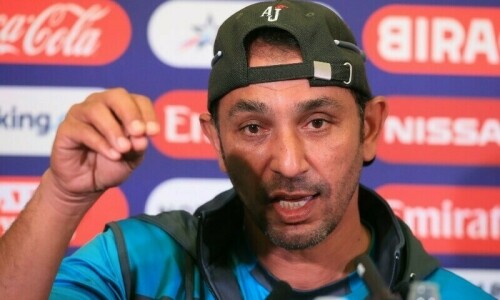Many were opposed to the idea of the ‘Big Three’ when it was first introduced in 2014 — effectively ceding most of the executive decision-making to the Board of Control for Cricket in India (BCCI), England & Wales Cricket Board (ECB) and Cricket Australia (CA).
The overhaul brought about wide-ranging changes in the International Cricket Council (ICC)’s revenue distribution model, administrative structures and the Future Tours Programme (FTP). There was little the ‘lesser’ cricket boards could do except accepting the formula. Pakistan itself thought long and hard before agreeing – albeit reluctantly.
Under the then Chairman Zaka Ashraf, Pakistan had refused to become a party to Big Three but their refusal mattered little since the proposal was already set for implementation with as many as nine votes in its favour and PCB on the verge of isolation.
Once Najam Sethi took over the reins, the PCB went about the mission of salvaging something from a ‘lost cause’. The decision by the Pakistan Cricket Board (PCB) to cast its vote for the Big 3 proposal was based on one main consideration: the Big 3 proposal had already carried by gathering nine votes out of ten and Pakistan’s vote was superfluous.
So the choice was to sit out and be excluded from any reckoning in the ICC or extract benefits in exchange for enabling a unanimous vote. Sethi’s decision was criticized at the time as a sign of nationalist weakness. With emotions running high due to the country’s pride being supposedly ‘compromised’ and a court battle within the country for the control of the cricket administration, few at the time realized that the decision had elevated the PCB to the status of the fourth largest member of the ICC in terms of its share in the revenues.
Most importantly, Sethi persuaded the BCCI to sign a bilateral agreement to play six series against Pakistan at a neutral venue - the revenues from four accruing to PCB and two to BCCI - starting in Dec 2015 and ending in 2022. The projected revenues to PCB from the four series were estimated at above $200 million.
The PCB also earned the right to nominate the ICC President — the great Zaheer Abbas was appointed to the post for one year. Importantly, the country also got a seat in the all powerful ICC Executive Committee — which deals with the day to day running of the ICC as well as important matters like constitution, corruption, ethics, integrity and development.
In short, even though the options were limited, the PCB did manage to bargain effectively in Pakistan’s favour.
Unfortunately though, owing to bad relations between the governments of India and Pakistan, the BCCI failed to fulfill its commitment to make its team play six bilateral series against Pakistan; in fact, not a single series has been played between the two South Asian neighbours since the 2012-13 season amid heightened political tensions.
This was a setback. Significantly, it was the agreement on this point that was highlighted as the biggest win for Pakistan as a series against India always ensures windfall profits for the cricket board.
With almost no international cricket having taken place in Pakistan over the past eight years and the Indian Govt.’s continued refusal to allow its team to engage in bilateral encounters with Pakistan, the country’s cricket administrators have finally decided to serve a legal notice to their Indian counterparts. In addition, the case is also set to be heard in ICC’s Dispute Resolution Committee.
The PCB remains confident of getting its due compensation from the BCCI and the board’s legal team has done some solid work in consultation with some top lawyers who feel that the Indian board has made serious violations of the bilateral series contract signed in 2014 and must compensate Pakistan for failing to honour the agreement. The chances of playing a bilateral series hinge on improvement in Indo-Pak relations.
With Big Three now disbanded, rosier days seem to lie ahead for Pakistan as the new finance model agreed during the recently-held ICC Board meeting guarantees US$ 132m for the country’s cricket board over an eight-year period effective 2015 which is about $1.5 million a year above the previous figure.
In another significant move, the ICC has also reviewed the security report of the Pakistan Super League (PSL) final in Lahore and is now set to send a high-profile World XI to Pakistan for a three match T20 series in September. According to the ICC statement the security plans and budgets for the tour are being considered.
Some of the leading T20 exponents are expected to feature in the series which should further improve Pakistan’s chances securing a high profile international series at home in the nearby future besides hosting eight PSL games next season.
The PCB management has succeeded in salvaging Pakistan’s interest in the crucial ICC meeting, now proper follow through steps must be taken to ensure that the gains help benefit the game in the country in the long run.
Published in Dawn, May 3rd, 2017















































